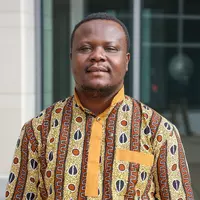GER Early Career Award
This award was updated in 2023.
The Early Career Award is linked to the career stage associated with the formation and establishment of one's research area. To be eligible for this award, a nominee must be an active member of the NAGT-GER Division. Furthermore, it is an eligibility requirement that the nominee be in the last two years of a PhD program or in the first three years of a GER position/career.
Examples of outstanding contributions to GER, GER's applications to geoscience education, discipline-specific research contributions to geoscience education, and capacity building within the GER community commensurate with an early career stage may include, but are not limited to, the following:
- Contributing to the development of GER as a scholarly field
- Enhancing diversity, equity, and inclusion in the geosciences
- Presenting their research at GER and/or STEM education conferences
- Publishing their research in GER and/or STEM education journals
- Advocating for or raising awareness of the critical importance of GER in well-rounded geoscience departments and programs
- Encouraging and supporting the integration of GER findings into geoscience teaching contexts, including translational scholarship that operationalizes ways in which GER findings can and should inform geoscience teaching in a variety of contexts (formal, informal, university-level, K-12, etc.)
- Collaborating with PhD advisor/committee to publish doctoral research
- Demonstrating post-PhD collaborations with mentors, peers, or others
- Mentoring a diversity of young scholars (e.g., mentorship of high school students, undergraduate students, and/or peers)
The Early Career Award recipient will receive (1) a complimentary one-year membership to NAGT and its GER Division and (2) a complimentary ticket to the NAGT luncheon at GSA, where the awardee will be recognized. Awardees will also be profiled in the GER Division's newsletter and included in the NAGT newsletter.
The GER Division particularly encourages nominations of BIPOC scholars and individuals from other groups that have been historically marginalized in or excluded from the geosciences. Awardees will be selected by a committee composed of the NAGT-GER Division Past President and Vice President, and 2 division members. Nominations for this award will be kept under consideration for 3 years.
Nomination Process
Potential awardees can be identified through independent nominations and/or self-nominations. The GER Division particularly encourages nominations of BIPOC scholars and individuals from other groups that have been historically marginalized in or excluded from the geosciences. Nomination packages will be accepted through the online nomination form.
Nomination packets should be compiled into a single PDF document and must include:
- A current CV with the publication record of the nominee
- A nominee-prepared statement that addresses how the nominee (1) conceptualizes their GER program at their current career stage, (2) disseminates their GER, (3) applies their GER and/or other STEM education research to their course and curriculum development and their teaching, (4) benefits from collaborations, and (5) engages in GER capacity-building efforts,
- Two letters of support from two different individuals (not the nominee) that discuss the nominee's scholarly contributions to the field of GER, application of GER to geoscience education (e.g., teaching), research collaborations, and GER capacity-building efforts. The nominator's letter is considered one of the two letters. At least one letter must be from a current member of the GER Division.
Final awards decisions will be made by the NAGT-GER Awards Committee with input from external reviewers. The NAGT-GER Awards Committee comprises the Past President, Vice President, and Secretary. External reviewers will be active NAGT-GER Division members and GER scholars at the post-doctoral career stage or more advanced career stage. Nominations for this award will be kept under consideration for 3 years.
Early Career Award Nominations
Award Timeline
Nomination period opens: April 1
Nominations due: June 1
Award committee decision: by August 15
2025 Award Winner
Dr. Larry Collins is a geoscience education researcher and Assistant Professor of Earth/Environmental Science at Longwood University where he also serves as Director of the Environmental Education Center. Previously, Dr. Collins was an Assistant Professor at Delta State University in Cleveland, MS. He completed his PhD at Washington State University, M.S. at Mississippi State University, and B.S.E. at Mansfield University of PA. Dr. Collins has published several papers and co-authored numerous conference presentations that have focused on several areas of GER including the nature of science, climate change education research, course-based undergraduate research experiences, and in paleontological art. Dr. Collins also mentors a research group at his home institution of students who study socio-scientific issues such as climate change. He has also served numerous roles in professional organizations such as the NAGT-GER (where he is elected as incoming President) Division, Geological Society of America, and the Geosciences Division of CUR.
Past Awardees
2024 Early Career Award Winner: Samuel Nyarko
Dr. Samuel Cornelius Nyarko "Sammy" is an assistant professor in the Department of Earth Sciences and the PI for the Earth Sciences Education Research Lab at IUI. Sammy's research covers the nature of geoscience, teamwpork process skills, climate change education and inclusive departmental practices. Aside from researching how people learn and effective practices of teaching in the Earth Sciences, Sammy loves watching soccer and following local news from his home country, Ghana. Sammy is an associate editor for the Journal of Geoscience education, and the 2022 outstanding reviewer for the Journal of Geoscience Education. Sammy is also the past chair of the National Association of Geoscience Teachers Diversity, Equity, and Inclusion (DEI) committee.
2023 Early Career Award Winner: Laura Lukes
Dr. Laura Lukes is a geoscience education researcher and Assistant Professor in the Earth, Ocean and Atmospheric Sciences Department at the University of British Columbia (Canada). Previously, Dr. Lukes was the Assistant Director for Teaching Excellence in the Stearns Center for Teaching and Learning at George Mason University (USA). She completed her PhD at North Carolina State University, her M.Ed. at Ohio State University, and her M.S. at Virginia Tech. Her professional contributions range from research to community capacity building.Her paper, Creating a Community of Practice Around Geoscience Education Research: NAGT-GER, helped set a new course for GER community structure and support. Her concept diagram of GER as a nexus of geoscience, education, and social science has evolved to be a foundational visualization, aiding how we communicate about GER to those outside this interdisciplinary field. She had wide-ranging impact through leading faculty professional development initiatives at GMU. At UBC, she is lead PI for an initiative working to reimagine field-based science courses and study models of faculty and curricular development and instructor-Indigenous community partnerships. Dr. Lukes was the first president of NAGT GER Division and a NSF Albert Einstein Distinguished Educator Fellow. She is currently AGU Education Section President-Elect.


![[reuse info]](/images/information_16.png)

